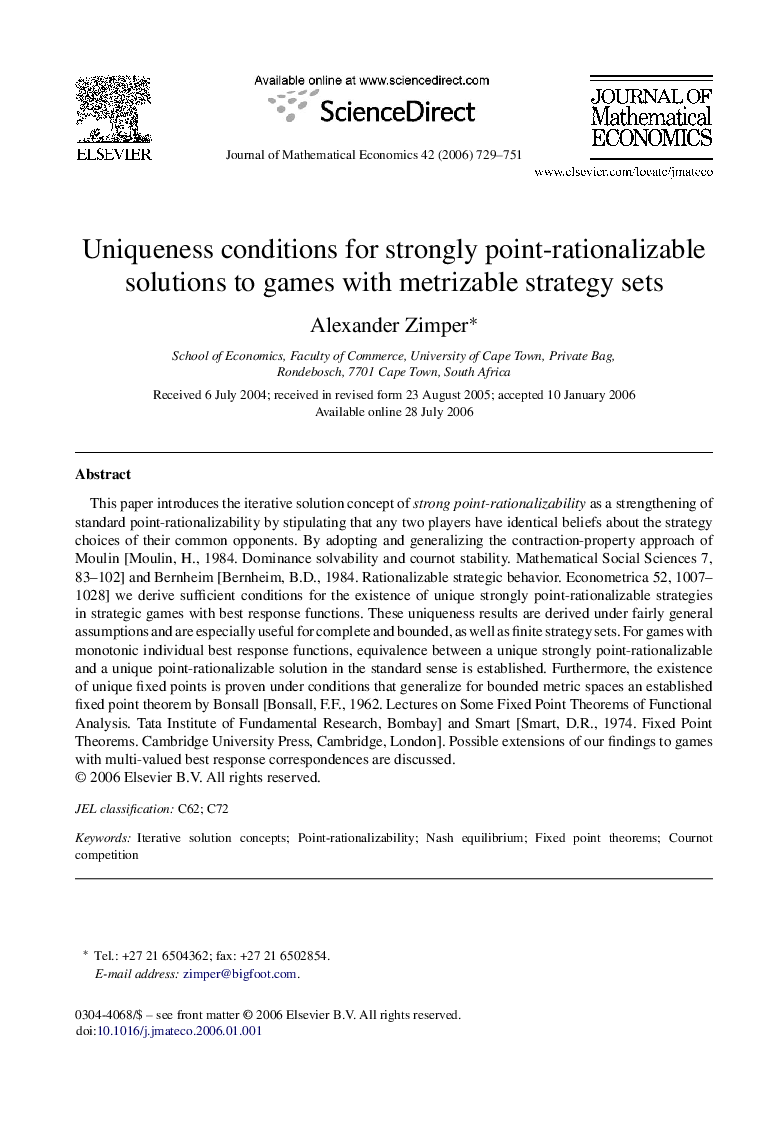| کد مقاله | کد نشریه | سال انتشار | مقاله انگلیسی | نسخه تمام متن |
|---|---|---|---|---|
| 966482 | 930977 | 2006 | 23 صفحه PDF | دانلود رایگان |
عنوان انگلیسی مقاله ISI
Uniqueness conditions for strongly point-rationalizable solutions to games with metrizable strategy sets
دانلود مقاله + سفارش ترجمه
دانلود مقاله ISI انگلیسی
رایگان برای ایرانیان
کلمات کلیدی
موضوعات مرتبط
مهندسی و علوم پایه
ریاضیات
ریاضیات کاربردی
پیش نمایش صفحه اول مقاله

چکیده انگلیسی
This paper introduces the iterative solution concept of strong point-rationalizability as a strengthening of standard point-rationalizability by stipulating that any two players have identical beliefs about the strategy choices of their common opponents. By adopting and generalizing the contraction-property approach of Moulin [Moulin, H., 1984. Dominance solvability and cournot stability. Mathematical Social Sciences 7, 83-102] and Bernheim [Bernheim, B.D., 1984. Rationalizable strategic behavior. Econometrica 52, 1007-1028] we derive sufficient conditions for the existence of unique strongly point-rationalizable strategies in strategic games with best response functions. These uniqueness results are derived under fairly general assumptions and are especially useful for complete and bounded, as well as finite strategy sets. For games with monotonic individual best response functions, equivalence between a unique strongly point-rationalizable and a unique point-rationalizable solution in the standard sense is established. Furthermore, the existence of unique fixed points is proven under conditions that generalize for bounded metric spaces an established fixed point theorem by Bonsall [Bonsall, F.F., 1962. Lectures on Some Fixed Point Theorems of Functional Analysis. Tata Institute of Fundamental Research, Bombay] and Smart [Smart, D.R., 1974. Fixed Point Theorems. Cambridge University Press, Cambridge, London]. Possible extensions of our findings to games with multi-valued best response correspondences are discussed.
ناشر
Database: Elsevier - ScienceDirect (ساینس دایرکت)
Journal: Journal of Mathematical Economics - Volume 42, Issue 6, September 2006, Pages 729-751
Journal: Journal of Mathematical Economics - Volume 42, Issue 6, September 2006, Pages 729-751
نویسندگان
Alexander Zimper,